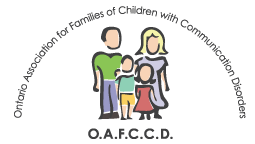Ontario Association for Families of Children with Communication Disorders - OAFCCD - is the perfect place to find parent resource information, parent support activities and public awareness activities. The association works with families and communities to ensure all children with communication needs have access to effective speech and language services. Here, families can find resources, tips, and news about services, funding and getting involved. Go ahead, check it out for yourself!
KidsTalk Wellington provides speech and language services to children in Wellington County. This blog contains resources for parents and professionals seeking resources, current research and best practices in the areas of speech, language and literacy development. www.kidstalkwell.com
Saturday, 30 April 2016
Tuesday, 26 April 2016
Major funding - and major changes - for autism services
In early April, the government announced a new Ontario Autism Program with $333 million dollars in funding, but this announcement came with the news of changes too. These changes to government funded-intensive therapy include age restrictions of 2-4 years, and the release of any children over 5 years old currently on the waiting list for intervention. Since the announcement, some families and staff from local providers have gathered for rallies and have spoken with members of local government. They are using these encounters as well as social media to share their stories and voice their concerns over these sudden and significant changes - speaking up for their children and clients alike. Find the details here, from CTV news.
Thursday, 21 April 2016
What's that again?
Plenty of research has shown that the amount of language children hear in the first years of life is undeniably important to their own verbal abilities later, and some are now focussing on the quality of that language. Using short repeated utterances has been found to play a role in language development and identification skills. Check out the details of this research HERE!
Saturday, 16 April 2016
Low levels of hormone linked to social deficit in autism
Stanford Medicine reports findings that children with autism present with low levels of a hormone that affects their ability to empathize with others. Researchers have found a correlation between the low levels of this hormone - vasopressin - and the inability of autistic children to understand that the feelings and perspectives of others differ from their own. Check out how these researchers investigated this hormone to find these correlations, and what the effects of this hormone may mean for future treatment.
Wednesday, 6 April 2016
Concussion Recovery
Check out this helpful Concussion Handbook created with the expertise of Holland Bloorview Kids Rehabilitation Hospital Concussion Centre. This guide is intended to provide information about concussion and it's potential effects, strategies for recovery, and self-management tools. Discover how to improve recovery time by resting your brain and body, and along what timeline you can begin to reintegrate different types of activities.
Find this guide and other helpful resources from Holland Bloorview Kids Rehabilitation Hospital.
Tuesday, 5 April 2016
A newfound link between brain injuries and ADHD
Researchers in Toronto have found a link between brian injuries and ADHD - and it goes both ways. Suffering from a Traumatic Brain Injury (TBI) has been found to make a person 2 1/2 times more likely to screen positive for ADHD, while having ADHD makes a person who has had a TBI will incur future traumatic brain injuries. The increased chance brought on by the presence of ADHD is due to the individuals' impaired attention, making them less aware of danger for example. The relation between these injuries to the brain and an attention disorder draws even more attention to the importance of the healing process following any kind of brain injury - including concussions.
Maclean's - A newfound link between brain injuries and ADHD
Maclean's - A newfound link between brain injuries and ADHD
Saturday, 2 April 2016
Bedtime Stories for Young Brains
Reading a bedtime story can be a signal in routine that the time to sleep is nearing. It can be a chance to escape to a make-believe world, or just a calming wrap-up to a busy day. But according to studies, reading bedtime stories - really, any stories at any time of day, can be so much more. Children who are frequently read to, and with, from a young age have more experience attaching images to words and stories they hear. It can help them understand, and later support the transition to books without pictures. This simple act of reading together is not just an enjoyable time together - it can truly impact your child's learning, language development, and even future school success.
Subscribe to:
Comments (Atom)






